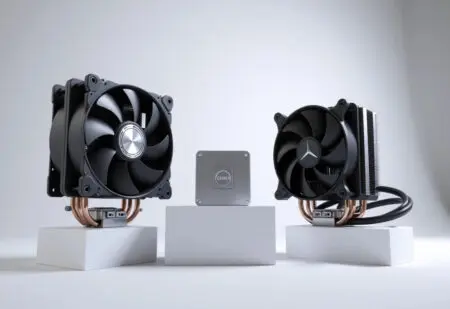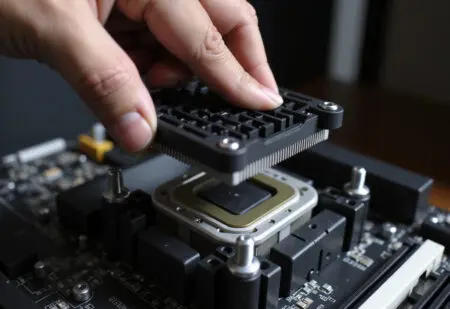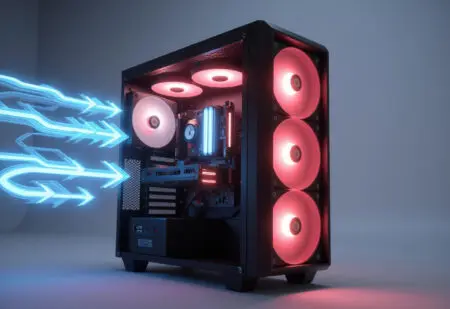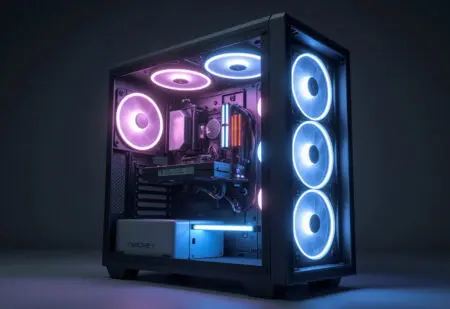Let’s just get this out of the way right now: for the overwhelming majority of people reading this, the Core i7 is the better, smarter, and more practical choice for a gaming laptop. But for a very specific type of user, the Core i9 isn’t just a luxury; it’s a necessity. The frustrating thing is, the answer isn’t a simple numbers game. I’ve spent countless hours staring at benchmark charts and real-world gameplay videos, and the conclusion is always the same—it’s complicated. So, when we ask, Is i7 or i9 better for gaming in laptops, we aren’t just comparing two chips.
In reality, we’re diving into a much deeper conversation about thermal dynamics, manufacturer design, and what you, the gamer, actually do with your machine when you’re not playing.
This isn’t just about which CPU has a bigger number on the box. It’s about finding the genuine sweet spot between raw power, usable performance, and your hard-earned cash.
More in CPUs & Processors Category
Is Ryzen 7 5700X Good for Gaming
Is Ryzen 7 5800X Good for Gaming
What’s the Real Difference Between a Core i7 and a Core i9 Anyway?
On the surface, the comparison seems straightforward. Intel positions the Core i9 as the top-tier, no-compromise processor, while the Core i7 sits just below it as the high-end enthusiast choice. Generally, this distinction comes down to a few key specifications: more cores, more threads, and slightly higher clock speeds for the i9.
Think of it like this: a modern Core i7 is a finely tuned track car. It’s incredibly fast, responsive, and more than capable of handling anything you throw at it on a racetrack. A Core i9, on the other hand, is a Formula 1 car. While it is technically faster in a straight line under perfect conditions, it’s also much hotter, demands a world-class cooling system, and its true potential can only be unlocked in very specific scenarios. For most drivers—or gamers—the track car is not only sufficient but often more enjoyable and consistent.
Do More Cores Actually Matter for Gaming?
For years, the answer was a resounding “no.” Games relied heavily on single-core performance, meaning the speed of one core was far more important than the number of cores available. Today, that’s changing, but not as fast as you might think. While newer games are getting better at utilizing multiple cores, the primary gaming workload still heavily favors high clock speeds.
Consequently, the extra cores an i9 often provides don’t always translate into a significant FPS boost. You might see a larger impact in specific genres that require complex calculations running in the background.
- Real-Time Strategy (RTS) Games: Titles like Total War: Warhammer III or Age of Empires IV with thousands of units on screen can leverage more cores.
- Complex Simulation Games: Think Microsoft Flight Simulator or Kerbal Space Program, where the physics engine is constantly running complex simulations.
- Open-World Games with Heavy AI: Some massive open-world titles with complex NPC and world-state tracking can see a minor benefit.
If you want to dive deeper into how cores work and why more isn’t always better for every single task, Cornell University has a surprisingly easy-to-read explanation on the topic that breaks it down without getting too technical. For most action, RPG, and shooter games, however, the performance difference is often negligible.
What is “Clock Speed” and Why Does It Seem So Important?
Clock speed, measured in gigahertz (GHz), is essentially how many calculations a processor can perform per second. For gaming, this is a critical metric because it directly impacts how quickly the CPU can process game logic, physics, and instructions, which then feeds information to your graphics card (GPU) to render a frame.
Both modern Core i7 and Core i9 processors feature incredibly high “boost clocks.” This means they can ramp up their speed for short bursts to handle demanding tasks. An i9 might have a 100 or 200 MHz advantage on paper, but as we’re about to see, whether it can actually sustain that higher speed in the real world is a completely different question.
The Elephant in the Room: Can a Laptop Even Handle a Core i9?
This, right here, is the most important part of the entire discussion. Processors generate heat, and a Core i9, with its higher core counts and clock speeds, generates a lot of heat. In a big, airy desktop PC with massive fans and liquid coolers, this isn’t a problem. In a laptop chassis that’s less than an inch thick, it’s a massive engineering challenge.
I’ve personally tested high-end laptops where the Core i9 inside performed worse than a Core i7 in a competing machine simply because it got too hot, too fast. This phenomenon is called thermal throttling. Essentially, when the CPU reaches a certain temperature, it automatically reduces its own speed to prevent damage. So, you pay a premium for that high-end i9, only for it to slow itself down to i7 levels (or worse) because the laptop’s cooling can’t keep up.
Why Does Thermal Throttling Happen More in Laptops?
The design of a laptop is a constant battle between performance and portability. The very things that make a laptop portable also make it difficult to cool. It’s a simple matter of physics, really.
Here are the main culprits:
- Limited Space: There’s simply not enough room for the large heatsinks and fans that high-power CPUs require.
- Shared Cooling: The CPU and GPU, the two hottest components, often share the same heat pipes. When both are working hard during a gaming session, they’re essentially competing for the limited cooling capacity.
- Airflow Constraints: Thin and light designs, while sleek, severely restrict the amount of air that can be moved through the system to carry heat away.
So, Does an i9 Just Turn My Laptop into a Heater?
Not necessarily, but the performance you get is almost entirely dependent on the quality of the laptop you buy it in. A cheap laptop with an i9 is a recipe for disaster and a complete waste of money. However, premium gaming laptops from manufacturers known for their robust cooling solutions (like certain high-end models from ASUS ROG, Alienware, or Razer) are specifically engineered to handle the heat.
These machines often feature large vapor chambers, multiple high-speed fans, and cleverly designed ventilation. Even in these best-case scenarios, though, an i9 will run hot and the fans will be loud. You have to be willing to accept that trade-off.
Let’s Talk Frames Per Second (FPS): Where Will You See a Difference?
For gamers, FPS is the ultimate measure of performance. It’s crucial to understand that in most gaming scenarios, your performance is limited by your Graphics Processing Unit (GPU), not your Central Processing Unit (CPU). The GPU is responsible for drawing the images on your screen, and this task becomes exponentially harder as you increase the resolution and graphical settings. This situation is known as being “GPU-bound.”
At What Resolution Does the CPU Start to Matter?
The relationship between your CPU and GPU changes depending on the resolution you play at. It’s a balancing act.
- 1080p (1920×1080): At this lower resolution, the GPU can render frames very quickly. The CPU has to work hard to keep up, feeding it instructions fast enough. This is where a faster CPU can make the biggest difference, especially for achieving ultra-high frame rates (144+ FPS). The gap between an i7 and i9 is most noticeable here, though it’s still often just a few percentage points.
- 1440p (2560×1440): This is the current sweet spot for many gamers. The workload is more balanced between the CPU and GPU. An i7 is typically more than enough to keep a high-end GPU fed with data.
- 4K (3840×2160): At 4K, the GPU is under an immense amount of stress. It becomes the primary bottleneck. Frankly, if you’re gaming at 4K on a laptop, your GPU is crying for help long before even a Core i7 breaks a sweat. The performance difference between an i7 and an i9 at this resolution is almost always zero.
Are There Specific Games Where an i9 Pulls Ahead?
Yes, but they are often outliers. As mentioned before, CPU-intensive simulation and strategy games can show a measurable, albeit often small, advantage with an i9. In titles like Microsoft Flight Simulator, Civilization VI, or notoriously CPU-heavy games like Escape from Tarkov, an i9 might deliver a 5-10% FPS boost over an i7 in the same laptop chassis. You have to ask yourself if that marginal gain is worth the significant price increase and extra heat.
Who is a Laptop Core i9 Actually For?
This brings us to the practical application. After considering the thermals and the performance bottlenecks, we can clearly define who should even be considering these two processors.
Are You Just a Gamer?
If your primary use for the laptop is gaming, with some light web browsing, streaming, and office work on the side, the Core i7 is unequivocally the better choice. It is the king of price-to-performance. The hundreds of dollars you save by opting for the i7 over the i9 can be invested in components that will give you a much more significant and noticeable upgrade.
Here’s why the i7 is the smarter pick for pure gamers:
- Better Value: The money saved can go towards a more powerful GPU (like upgrading from an RTX 4070 to a 4080), which will provide a massive FPS boost.
- More RAM or Storage: You could double your RAM from 16GB to 32GB or get a larger SSD, improving overall system responsiveness and load times.
- Cooler and Quieter Operation: The i7 will generally run cooler, leading to more consistent performance and less fan noise.
- Minimal FPS Difference: In the vast majority of games, the real-world performance difference is so small you wouldn’t notice it without an FPS counter running.
Are You a Gamer AND a Content Creator?
This is the niche where the Core i9 begins to justify its existence. If you are a streamer, YouTuber, video editor, 3D artist, or programmer who also loves to game, the i9’s extra cores become a powerful tool. These professional applications are designed to use every bit of processing power available.
When I’m editing a 4K video project, those extra cores in an i9 can dramatically reduce the time I spend waiting for videos to render or for effects to be applied. In these scenarios, time is money, and the i9 pays for itself in productivity gains. The CPU can power through a complex code compilation or a 3D model render much faster, allowing you to get back to work—or gaming—sooner. For these hybrid users, the i9 offers a level of portable power that was unthinkable just a few years ago.
How Do I Compare Specific i7 and i9 Models?
It’s important to remember that not all i7s or i9s are created equal. Intel releases new generations every year, and a brand-new Core i7 can easily outperform a Core i9 from two or three years ago. Furthermore, Intel uses a suffix system in their model names that tells you about the processor’s intended use and power level.
What Do Those Letters at the End of the CPU Name Mean?
When you’re looking at laptop specs, you’ll see names like “Core i7-13700H” or “Core i9-13980HX.” Those letters are incredibly important.
- H-Series: These are the standard high-performance processors found in most gaming laptops. They offer a great balance of power and thermal efficiency.
- HK-Series: The “K” signifies that the processor is “unlocked,” meaning it can be overclocked for higher performance, assuming the laptop’s cooling can handle it.
- HX-Series: This is the highest-end “enthusiast” grade. These processors are essentially desktop-class chips adapted for laptops, offering the most cores and highest power draw. They absolutely require a top-tier cooling system.
Where Can I Find Reliable Benchmarks?
Don’t just trust the marketing materials. Before you make a purchase, do your homework by looking at independent reviews and benchmarks of the specific laptop model you are considering. Websites like NotebookCheck, as well as YouTube channels like Gamers Nexus and Linus Tech Tips, conduct in-depth testing that shows you how these CPUs perform in the real world, inside a specific chassis. This is the only way to know if that i9 you’re eyeing is actually performing better than its i7 counterpart.
The Final Verdict: Making the Smart Choice for Your Wallet and Your Games
So, after all that, the answer comes back to that initial, simple statement. For the dedicated gamer, the Core i7 represents the peak of sensible performance. It delivers an outstanding gaming experience without the extreme costs, heat, and power demands of its bigger sibling. It allows you to build a more balanced and cost-effective system where your money is spent on the components that matter most for gaming.
The Core i9 is not a better gaming CPU; it’s a more specialized one. It’s a workstation-class processor crammed into a laptop form factor, designed for the professional or “prosumer” who needs to crush heavy multi-threaded workloads by day and play the latest AAA titles by night.
Don’t get caught up in the marketing hype that bigger is always better. An impressive spec sheet doesn’t mean anything if the performance is throttled by heat. A well-balanced system with a Core i7 and a top-tier GPU will make you a much happier and wealthier gamer in the long run. Choose the tool that’s right for your actual needs, not just for the bragging rights.
Frequently Asked Questions – Is i7 or i9 Better for Gaming in Laptops
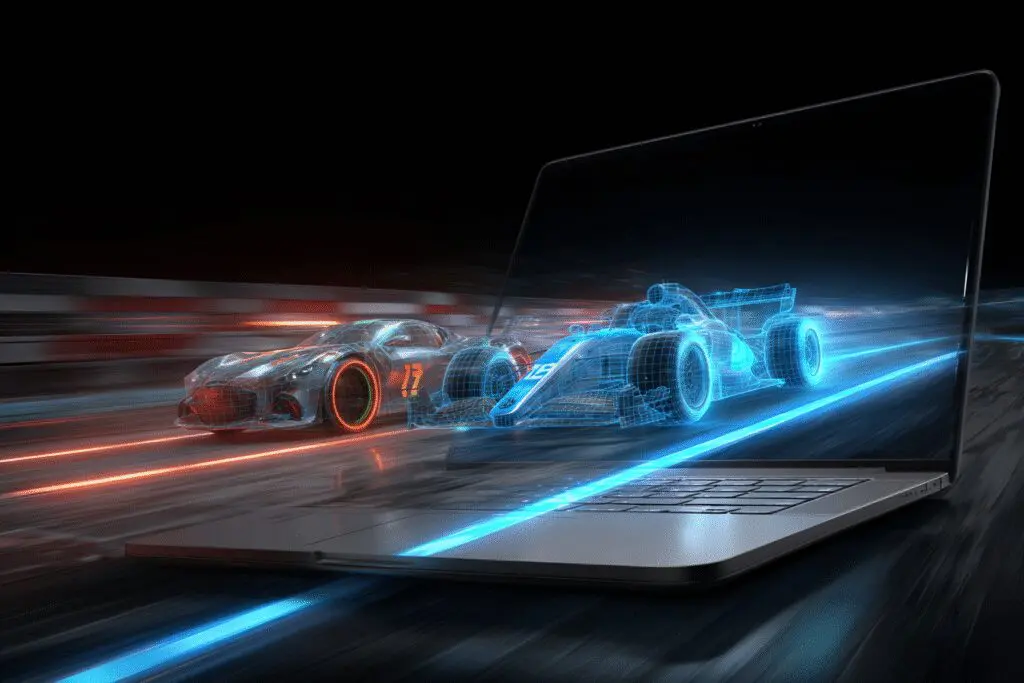
For general non-gaming tasks like streaming, video editing, or content creation, which CPU is better: i7 or i9?
For tasks like streaming, video editing, or 3D rendering, an i9 is generally more suitable because of its higher core count and faster speeds, which can significantly reduce processing times and improve productivity, especially in well-cooled, high-end laptops.
Should I choose an i7 or i9 if I want high frame rates for competitive gaming at 1080p?
An i9 can provide a slight advantage, such as a 5-10% increase in frame rates at lower resolutions like 1080p for competitive games. However, this gain may not justify the higher cost for most gamers, especially if they prioritize the GPU.
How does cooling affect the performance of i7 and i9 CPUs in laptops?
Laptop cooling systems limit how much power a CPU can use to prevent overheating. A well-cooled, larger gaming laptop can handle a Core i9 better and maintain high speeds, while thinner laptops may experience thermal throttling, reducing performance to prevent damage.
Is a Core i7 or i9 better for gaming in laptops based on real-world performance?
For most gaming scenarios, the performance difference between a Core i7 and i9 in laptops is minimal, as most modern games rely more on the GPU. The CPU difference is often less noticeable at higher resolutions where the graphics card becomes the bottleneck.
What are the main differences between a Core i7 and a Core i9 CPU in laptops?
A Core i9 typically has more cores, higher speeds, and better performance for high-end tasks compared to a Core i7. However, in laptops, thermal limits often prevent the i9 from reaching its full potential unless the cooling system is very effective.

